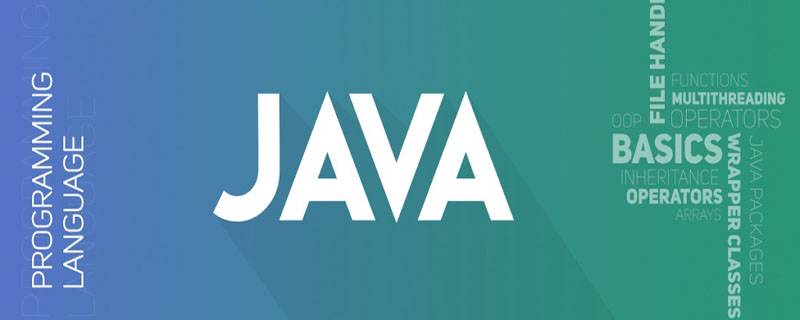What are the formats for defining arrays in java?
The format for defining arrays in java is: 1. [int[] arr = new int[5]]; 2. [int[] arr = new int[]{1,2,3,4, 5}]. In the Java language, the length (the number of elements in the array) cannot be specified when declaring an array.

The definition format of arrays is as follows:
(Recommended tutorial: java entry program)
When defining an array, the declaration and space initialization are usually written together, as follows:
int[] arr = new int[5];
int arr[] = new int[5]; //不推荐
int[] arr = new int[]{3,1,2,5,6}
int[] arr = {3,1,2,5,6}Example:
(Video tutorial recommendation: java video tutorial)
The following is a way to only declare an array, but not initialize it:
// 声明整型数组 int[] intArray0 ; int intArray1 []; // 声明浮点型数组 float floatArray0 []; float[] floatArray1 ; // 声明布尔型数组 boolean boolArray0 []; boolean[] boolArray1 ; // 声明字符型数组 char charArray0 []; char[] charArray1 ; // 声明字符串数组 String stringArray0[]; String[] stringArray1; // 错误的声明数组的方式,声明数组的时候不能指定其大小 // int [5] intErrorArray0; // int intErrorArray1[5];
Note: When declaring an array in Java language, you cannot specify its length (the number of elements in the array ).
This is because the array is a reference type variable, so when you use it to define a variable, it only means that a reference variable is defined (that is, a pointer is set). This reference variable also It does not point to any valid memory, so the length of the array cannot be specified when defining the array.
And since defining an array only defines a reference variable and does not point to any valid memory space, there is no memory space to store the array elements, so this array cannot be used until the array is initialized. can use.
The above is the detailed content of What are the formats for defining arrays in java?. For more information, please follow other related articles on the PHP Chinese website!

Hot AI Tools

Undresser.AI Undress
AI-powered app for creating realistic nude photos

AI Clothes Remover
Online AI tool for removing clothes from photos.

Undress AI Tool
Undress images for free

Clothoff.io
AI clothes remover

AI Hentai Generator
Generate AI Hentai for free.

Hot Article

Hot Tools

Notepad++7.3.1
Easy-to-use and free code editor

SublimeText3 Chinese version
Chinese version, very easy to use

Zend Studio 13.0.1
Powerful PHP integrated development environment

Dreamweaver CS6
Visual web development tools

SublimeText3 Mac version
God-level code editing software (SublimeText3)

Hot Topics
 1376
1376
 52
52
 Square Root in Java
Aug 30, 2024 pm 04:26 PM
Square Root in Java
Aug 30, 2024 pm 04:26 PM
Guide to Square Root in Java. Here we discuss how Square Root works in Java with example and its code implementation respectively.
 Perfect Number in Java
Aug 30, 2024 pm 04:28 PM
Perfect Number in Java
Aug 30, 2024 pm 04:28 PM
Guide to Perfect Number in Java. Here we discuss the Definition, How to check Perfect number in Java?, examples with code implementation.
 Random Number Generator in Java
Aug 30, 2024 pm 04:27 PM
Random Number Generator in Java
Aug 30, 2024 pm 04:27 PM
Guide to Random Number Generator in Java. Here we discuss Functions in Java with examples and two different Generators with ther examples.
 Weka in Java
Aug 30, 2024 pm 04:28 PM
Weka in Java
Aug 30, 2024 pm 04:28 PM
Guide to Weka in Java. Here we discuss the Introduction, how to use weka java, the type of platform, and advantages with examples.
 Smith Number in Java
Aug 30, 2024 pm 04:28 PM
Smith Number in Java
Aug 30, 2024 pm 04:28 PM
Guide to Smith Number in Java. Here we discuss the Definition, How to check smith number in Java? example with code implementation.
 Java Spring Interview Questions
Aug 30, 2024 pm 04:29 PM
Java Spring Interview Questions
Aug 30, 2024 pm 04:29 PM
In this article, we have kept the most asked Java Spring Interview Questions with their detailed answers. So that you can crack the interview.
 Break or return from Java 8 stream forEach?
Feb 07, 2025 pm 12:09 PM
Break or return from Java 8 stream forEach?
Feb 07, 2025 pm 12:09 PM
Java 8 introduces the Stream API, providing a powerful and expressive way to process data collections. However, a common question when using Stream is: How to break or return from a forEach operation? Traditional loops allow for early interruption or return, but Stream's forEach method does not directly support this method. This article will explain the reasons and explore alternative methods for implementing premature termination in Stream processing systems. Further reading: Java Stream API improvements Understand Stream forEach The forEach method is a terminal operation that performs one operation on each element in the Stream. Its design intention is
 TimeStamp to Date in Java
Aug 30, 2024 pm 04:28 PM
TimeStamp to Date in Java
Aug 30, 2024 pm 04:28 PM
Guide to TimeStamp to Date in Java. Here we also discuss the introduction and how to convert timestamp to date in java along with examples.




